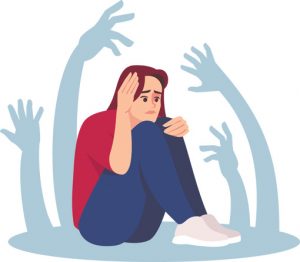By Steven Stein, MD – Board-certified Psychiatrist
 Anxiety, often misunderstood and underestimated, is a prevalent mental health issue affecting millions worldwide. While it’s normal to experience occasional worry or stress, persistent and excessive anxiety can disrupt daily life and overall well-being. Understanding the various types of anxiety disorders is crucial for proper recognition, management, and support.
Anxiety, often misunderstood and underestimated, is a prevalent mental health issue affecting millions worldwide. While it’s normal to experience occasional worry or stress, persistent and excessive anxiety can disrupt daily life and overall well-being. Understanding the various types of anxiety disorders is crucial for proper recognition, management, and support.
Generalized Anxiety Disorder (GAD) is characterized by excessive, uncontrollable worry about various aspects of life, such as work, health, and relationships. Individuals with GAD often anticipate disaster and may struggle to relax, even when there’s no apparent reason for concern. Physical symptoms like muscle tension, restlessness, and difficulty concentrating are common manifestations of GAD.
Situational Anxiety is triggered by specific events or situations, such as public speaking, exams, or job interviews. While many people experience nervousness in such circumstances, situational anxiety can be debilitating, causing intense fear and avoidance behaviors. With proper coping strategies and support, individuals can manage situational anxiety effectively.
Social Anxiety Disorder (SAD), also known as social phobia, involves an intense fear of social situations and scrutiny by others. Individuals with SAD may avoid social gatherings, public speaking, or even everyday interactions out of fear of embarrassment or judgment. Physical symptoms like blushing, sweating, and trembling often accompany social anxiety, making it challenging to navigate social interactions.
Psychosomatic Symptoms refer to physical manifestations of psychological distress, often linked to anxiety. These symptoms can include headaches, stomachaches, fatigue, and insomnia, among others. While they may not have a clear physical cause, psychosomatic symptoms can significantly impact daily functioning and quality of life, underscoring the mind-body connection in anxiety disorders.
Panic Disorder is characterized by recurrent, unexpected panic attacks accompanied by intense physical sensations and overwhelming fear. Panic attacks can strike suddenly and peak within minutes, leading to feelings of impending doom or loss of control. Individuals with panic disorder may develop agoraphobia, avoiding places or situations where panic attacks have occurred in the past.
Panic Attacks are brief episodes of intense fear or discomfort, often accompanied by physical symptoms like rapid heartbeat, sweating, trembling, and shortness of breath. While panic attacks can occur in various anxiety disorders, they can also occur independently, triggered by stress, trauma, or even without an apparent cause. Understanding panic attacks and learning coping mechanisms can help individuals manage and reduce their frequency and intensity.
Recognizing the differences between these types of anxiety disorders is essential for accurate diagnosis and effective treatment. While each disorder has its unique characteristics, there’s often overlap in symptoms, making diagnosis challenging. Consulting with a mental health professional is crucial for proper evaluation and personalized treatment planning.
Treatment for anxiety disorders typically involves a combination of therapy, medication, and lifestyle changes. Cognitive-behavioral therapy (CBT) is one of the most effective forms of therapy for anxiety, helping individuals identify and challenge negative thought patterns and develop coping strategies to manage anxiety symptoms. Medications such as selective serotonin reuptake inhibitors (SSRIs) or benzodiazepines may be prescribed to alleviate symptoms and facilitate therapy progress.
In addition to professional treatment, self-care strategies can play a significant role in managing anxiety. Regular exercise, adequate sleep, healthy eating, and stress management techniques like mindfulness meditation and deep breathing exercises can help reduce anxiety levels and improve overall well-being.
Raising awareness about anxiety disorders is crucial for reducing stigma and encouraging individuals to seek help. By understanding the various types of anxiety and their impact on daily life, we can foster empathy,
support, and effective interventions for those struggling with anxiety. Together, we can create a more compassionate and inclusive society where mental health is prioritized and supported.
I am a board-certified general psychiatrist who works with adolescents, adults, and geriatric patients. I specialize in the evaluation and treatment of a wide array of psychiatric conditions including depressive and mood disorders, anxiety and panic disorders, ADHD, OCD, PTSD, personality disorders, and bipolar and schizophrenia spectrum illnesses. I also offer intranasal esketamine (Spravato) treatments for treatment-resistant depression. My clinic provides comprehensive care with a patient-centered approach and concentration on psychopharmacological interventions, while implementing supportive and motivational psychotherapies. All my staff are highly qualified, professional and courteous.
I am originally from the Tampa Bay, FL area where I completed my master’s degree at the University of South Florida. I attended medical school at Ross University School of Medicine and completed my psychiatric residency training at Tulane University School of Medicine.
I am based in Sarasota, FL and see patients in person or virtually. I also accept patients virtually throughout the state of Florida. Outside of TTMC, I continue to treat patients in the hospital setting. I believe that stable mental health is a fundamental cornerstone of achieving overall optimal health, vitality, satisfaction, success and purpose.
A Modern Approach
Our staff offers compassionate, non-judgmental, and evidence-based care to all patients. Tidewater Total Mind Care is a safe place for patients to confidentially navigate any of life’s obstacles.
Get started with Tidewater Total Mind Care, today.
(941) 202-1999
www.tidewatertotalmindcare.com







